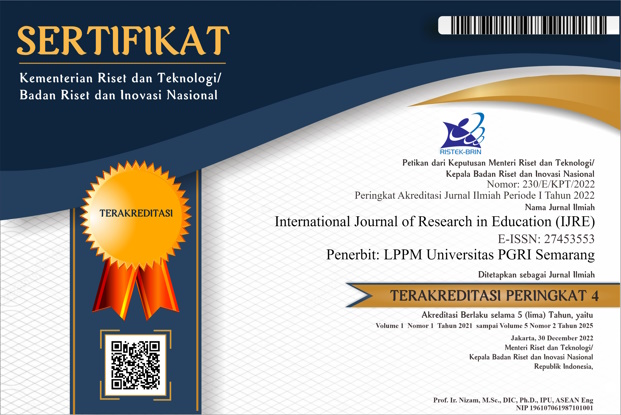The Role of Teacher Mover as Teacher Leadership at The State Elementary School of Ulujami District, Pemalang Regency
At The State Elementary School Of Ulujami District, Pemalang Regency
DOI:
https://doi.org/10.26877/ijre.v4i2.708Keywords:
Leadership, competence, teacher moverAbstract
There is a new paradigm and a curriculum that is constantly changing with technological developments, the role of teachers is required to follow these developments. One of the government's efforts in realizing educators who have competence to achieve national education goals is the Program Pendidikan Guru Penggerak (PPGP). Through PPGP, many teacher mover (guru penggerak) throughout Indonesia are graduated who are ready to enter schools and are expected to have a significant impact on schools and the education ecosystem. This study aims to identify the role of teacher mover as teacher leadership in improving the quality of schools at the state elementary school Ulujami District, Pemalang Regency. This study uses qualitative research with a descriptive approach. Data collected from a combination of literature studies, observations, and interviews were systematically analyzed to identify the role of teacher leaders as Teacher Leadership in improving school quality. The results of the study show that the role of teacher mover has an important contribution to teacher leadership in State Elementary Schools in Ulujami District, Pemalang Regency. The role of teacher mover includes being a learning leader, being a coach for others, encouraging collaboration, realizing student leadership, and mobilizing the community of practitioners. The advice given by the author to the teacher mover is to always actively carry out self- development, increase cooperation with various parties, collaborate with school residents and the community of teacher mover, and maintain self- motivation to become teacher leadership.
References
Adiansha, A. A. U. (2022). Analisis Dampak Kehadiran Guru Penggerak di Sekolah Dasar Kabupaten Bima. Jurnal Inovatif Ilmu Pendidikan, 4. https://jurnal.fkip.unila.ac.id/index.php/JIIP/index
Ally, M. (2019). Competency Profile of the Digital and Online Teacher in Future Education. The International Review of Research in Open and Distributed Learning, 20(2). https://doi.org/10.19173/irrodl.v20i2.4206
Angelle, P. S., & DeHart, C. A. (2016). Comparison and Evaluation of Four Models of Teacher Leadership. Research in Educational Administration & Leadership, 1(1), 85–119. https://doi.org/10.30828/real/2016.1.4
Azzahra, D. Y. (2024). Peran Guru Penggerak dalam Eksistensi Kurikulum Merdeka. Jurnal Ilmu Pendidikan Islam, 2. https://doi.org/https://doi.org/10.59059/al-tarbiyah.v2i2.915
Cosenza, M. N. (2015). Defining Teacher Leadership Affirming the Teacher Leader Model Standards. ERIC Journal, 24(Issues in Teacher Education). https://eric.ed.gov/?id=EJ1090327
Curtis, R. (2013). Finding a New Way: Leveraging Teacher Leadership to Meet Unprecendented Demand. The Aspen Institute.
Dharma, A. (2022). Bahan Ajar Pendidikan Guru Penggerak Paket Modul 1: Paradigma dan Visi Guru Penggerak Modul 1.2 “Nilai-nilai dan Peran Guru Penggerak.” Direktorat Jenderal Guru dan Tenaga Kependidikan Kemdikbudristek.
Elia, S. A. F. F. B. (2023). Konsep Kepemimpinan dalam Guru Penggerak. Jurnal Ilmiah PGSD FKIP Universitas Mandiri, 09. https://doi.org/https://doi.org/10.36989/didaktik.v9i5.2311
Faiz, A. F. (2022). Program Guru Penggerak sebagai Sumber Belajar. Jurnal Pendidikan Dan Pembelajaran, 14. https://ejournal.unisbablitar.ac.id/index.php/konstruktivisme/index
Langdon Warren, L. (2021). The Importance of Teacher Leadership Skills in the Classroom. Education Journal, 10(1), 8. https://doi.org/10.11648/j.edu.20211001.12
Mansyur, A. R. (2022). Wawasan Kepemimpinan Guru (Teacher Leadership) dan Konsep Guru Penggerak. Education and Learning Journal, 2(2), 101. https://doi.org/10.33096/eljour.v2i2.131
Nurjannah, E. T. H. N. P. N. A. L. (2023). Guru Penggerak sebagai Bentuk Peningkatan Kualitas Pendidikan. Jurnal Ilmiah Kependidikan. https://doi.org/https://doi.org/10.xxxx/xxxxx
Nurlaeli, Febriani, T., Syarifuddin, A., Hamzah, A., & Tastin. (2023). Creativity of Driving Teachers in Developing Learning Interests of Class V Elementary School Students. MIMBAR PGSD Undiksha, 11(2), 324–334. https://doi.org/10.23887/jjpgsd.v11i2.61615
Permendikbudristek Nomor 26 Tahun 2022. (n.d.).
Ridwan, A. (2022). Guru Penggerak sebagai Pemimpin Pembelajaran Society 5.0: Sebuah Kajian Literatur. Jurnal Pendidikan Islam, 1. https://jurnal-alfatih.biz.id/index.php/alfatih/article/view/27/15
Satriawan, Wahyu; Santika, Iffa Dian; Naim, A. (2021). Guru Penggerak dan Transformasi Sekolah dalam Kerangka Inkuiri Apresiatif. Jurnal Kependidikan Islam, 11. https://doi.org/https://doi.org/ 10.24042/alidarah.v11i1.7633
Schott, C., van Roekel, H., & Tummers, L. G. (2020). Teacher leadership: A systematic review, methodological quality assessment and conceptual framework. Educational Research Review, 31, 100352. https://doi.org/10.1016/j.edurev.2020.100352
Tahajudin, D., Rokmanah, S., & Putri, C. H. (2023). Optimalisasi Guru Sebagai Pemimpin Pembelajaran Pada Program Guru Penggerak. Jurnal Ilmiah Profesi Pendidikan, 8(4), 1967–1972. https://doi.org/10.29303/jipp.v8i4.1631
Undang-Undang Dasar Republik Indonesia tahun 1945. (n.d.).
Undang-Undang Nomor 14 Tahun 2005 pasal 10 ayat 1. (n.d.).
Undang-Undang Republik Indonesia Nomor 20 Tahun 2003. (n.d.).
York-Barr, J., & Duke, K. (2004). What Do We Know About Teacher Leadership? Findings From Two Decades of Scholarship. Review of Educational Research, 74(3), 255–316. https://doi.org/10.3102/00346543074003255
Zaeni, A., Abdullah, G., & Egar, N. (2017). Pengaruh kompetensi pedagogik guru dan sertifikasi guru terhadap kinerja guru sd/mi di kecamatan petarukan kabupaten pemalang. Jurnal Manajemen Pendidikan (JMP), 5(2). https://doi.org/10.26877/jmp.v5i2.1928



